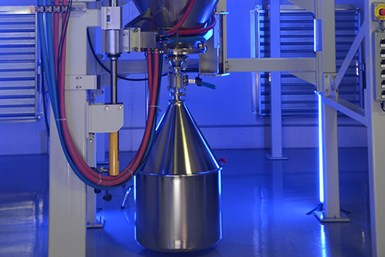Company Completes First Life Cycle Assessment for 6K Additive Process
The independent analysis shows 6K Additive’s UniMelt process uses 91% less energy with a 92% reduction in carbon emissions over traditional methods for nickel production.
Share

6K UniMelt process. Photo Credit: 6K Additive
6K Additive, a division of 6K, has received the results of an independent life cycle assessment (LCA) completed by Foresight Management, a sustainability and energy firm. The results show the company’s UniMelt process significantly reduces environmental impact in the key areas of energy usage and global warming, potentially helping 6K Additive customers lower their carbon footprint using metal additive manufacturing (AM).
According to the company, this is the first LCA of powder for AM ever completed. The LCA aimed to compare the quantifiable environmental impact between traditional metal powder production methods and 6K Additive’s UniMelt process.
“This assessment goes a long way in revealing how the UniMelt process exceeds traditional metal powder processing in environmentally important ways, while also pointing to the inefficiencies of atomization that currently plague AM material production,” says Frank Roberts, 6K Additive president. “Sustainability is at the core of who we are at 6K Additive and providing our customers with quantifiable numbers related to the environment helps them move closer to zero carbon manufacturing with AM.”
Foresight Management conducts life cycle assessments on products for companies to help them understand the impact their processes have on a global environmental scale. Its methodology includes primary and secondary data, as well as using professional GaBi software to provide data detailing environmental impact of sourcing, refining and processing.
“This is a cradle-to-end-user assessment of the UniMelt technology. We studied all known industrial processes from raw material acquisition and processing up through manufacturing and customer distribution,” says Brad Van Valkenburg, Foresight sustainability manager. “This assessment focused on nickel and titanium powders, both of which saw significant advantages when made using UniMelt process. The nickel results showed the UniMelt required 91% less energy and reduced carbon emissions by 92%, and the titanium results showed the UniMelt required, at minimum, 74% less energy and reduced carbon emissions by 78%.”
It is said organizations are starting to look to their suppliers to offer statistics that help them with their sustainability journey. Many companies are now asking for hard facts to back up sustainability claims and this study provides 6K Additive customers with valuable information to help them advance their AM manufacturing initiatives.
6K Additive says it is the world’s first producer of AM powder made from sustainable sources and its UniMelt system is the only microwave production-scale plasma with a highly uniform and precise plasma zone offering zero contamination. The company is capable of high-throughput production of advanced materials, including nickel 718/625, titanium64 grade 5/23, copper 18450/GRCop, stainless steel 316/17-4, refractories such as tungsten and tantalum.
Related Content
-
Video: AM for Repair of Large Shafts
Wind power shafts that might once have been scrapped are now returned to service. See the robotic directed energy deposition (DED) and shaft preheating system developed by Ikergune, Izadi and Talens.
-
Video: A Mechanical Method for Metal Powder Production
Metal Powder Works has developed a method for producing powders from solid barstock, no melting required. This video covers how the process works and benefits of mechanical production of powders.
-
BMW Group Vehicle to Adopt 3D Printed Center Console
A vehicle coming to market in 2027 will include a center console carrier manufactured through polymer robot-based large-format additive manufacturing (LFAM).














